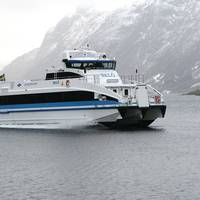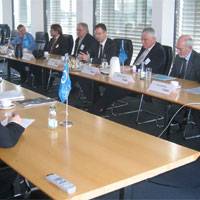MSC Adopts Amendments to SOLAS2020
International Maritime Organization (IMO)'s Marine Safety Committee (MSC) adopted amendments to SOLAS2020 that raise the damage stability requirements for passenger vessels in the event of flooding caused by a collision. These changes used as a basis a series of EU and European Maritime Safety Agency (EMSA) funded cooperative research projects conducted by academics, shipyards, ship operators, owners, classification societies and ship design consultants over several decades. “To their great credit, the funding and support provided by the EU and EMSA have enabled a research effort into safety that would otherwise not have been possible,” says Knut Ørbeck-Nilssen, CEO of DNV GL – Maritime.
Status Report: Lightweight Structures at Sea

SP Fire Technology’s involvement in fire-resistant lightweight materials for marine applications has contributed to the construction of several smaller lightweight vessels, and to the current discussion within the International Maritime Organization (IMO) of how larger ocean-going vessels could be built using plastic composites. 2005 saw the start of the LÄSS project, which clearly showed the potential economic and environmental benefits of using lightweight materials such as aluminum or fiber-reinforced polymer (FRP) composite for the construction of ships.
ECDIS, BNWAS Mandatory under SOLAS
Amendments to SOLAS regulation V/19, to make mandatory the carriage of Electronic Chart Display and Information Systems (ECDIS) and Bridge Navigational Watch Alarm Systems (BNWAS), under SOLAS chapter V, Safety of Navigation, were adopted, with an expected entry into force date of 1 January 2011. The requirements will be mandatory for new ships and phased-in for existing ships. • Amendments to the title of Chapter VI to read, Carriage of Cargoes “and Oil Fuels” and to Regulation VI/5-1 on Material safety data sheets (MSDS) to require MSDS to be provided for ships carrying oil or oil fuel, prior to the loading of such oil as cargo in bulk or bunkering of oil fuel. The MSC also approved Recommendations for material safety data sheets (MSDS) for MARPOL Annex I type cargoes and oil fuels.
IMO Safety Committee, Piracy on Agenda
IMO's Maritime Safety Committee (MSC) is meeting at the Organization's London Headquarters for its 86th session from 27 May to 5 June. The packed agenda includes discussion on piracy and armed robbery against ships off the coast of Somalia and in the Gulf of Aden, the implementation of the Long-Range Identification and Tracking (LRIT) system, the development of goal-based standards for new ship construction and the adoption of amendments to the International Convention for the Safety of Life at Sea (SOLAS). The MSC will review the latest statistics on piracy and armed robbery against ships, in particular in relation to the situation off the coast of Somalia and in the Gulf of Aden…
Maritime Research Project Complete

The European maritime research project on the significance of risk-based design and approval has been concluded after four years of intensive study. The multinational research project Safedor (Design, Operation and Regulation for Safety) was co-ordinated by ship classification society Germanischer Lloyd. 53 project partners from all sectors of the maritime industry were working on an innovative design approach to enhance safety at sea. The concluding working meeting took place…
Technical Committee Discusses Flexibility in Ship Design
The new "Technical Committee on Risk Management" of Germanischer Lloyd was established to respond to the growing significance of risk-based approaches for the maritime industry. The new committee's main objective is facilitation and consolidation of industry's needs related to the application of risk-based methods for future profitable maritime business. The new "Technical Committee on Risk Management" comprises representatives from all stakeholders of the maritime industry, namely ship owners and operators, ship builder and maritime systems' suppliers, insurance and engineering service providers. Guido Schulte, Head of Concept Design and R&D Department Akeryards, was elected as chairman; further members of the Committee are Dr S. Gerhard (Allianz), Mr M. Guenther (Hamburg Süd), Mr M.
Project SAFEDOR- Maritime Experts Meet in Munich
The approval procedures of risk-based ship design is one feature of the European research project SAFEDOR. The SAFEDOR research project views safety of ships as an objective of the design process and not as a limitation imposed by standards or regulations. Within the project, a framework had been developed which is required for risk based approval. Today, 25 representatives of regulatory authorities, flag states, governmental administrations and classification societies are taking part in a training course on approval of risk-based ship design in Munich. For risk-based ship design, operation and approval to be effectively implemented, there is an urgent need to develop ways of approving innovative designs in an effective, practical and flexible manner.
Public workshop on SAFEDOR
The maritime research project SAFEDOR has made considerable progress within the first year of its four year term. A one-day public workshop in London at IMO on 14 February 2006 jointly organized with the Royal Institution of Naval Architects will highlight some of the findings. The European Commission-supported, risk-based ship design research project launched a year ago, has successfully completed its first year of intensive research activities. The workshop provides an excellent opportunity for maritime engineers to familiarize with the principles underlying the concept and practical applications of risk-based ship design. In this approach…






